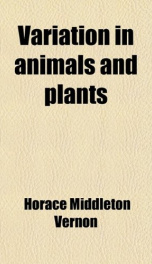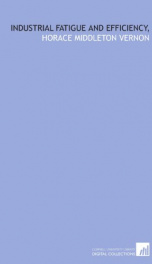variation in animals and plants

Purchase of this book includes free trial access to www.million-books.com where you can read more than a million books for free. This is an OCR edition with typos. Excerpt from book: CHAPTER III. COKKELATED VARIATIONS. The measurement of correlationGalton's functionCorrelation between various organs in man, in local races of the shrimp, and in crabsComparison between primitive and civilised races of man Correlation between morphological characters and the reproductive systemGenetic Selection in manEspecial fertility of type forms in certain plantsEvolution in the Peppered mothParallel variationImportance of mathematical treatment of variation. All parts of an organism arc to a certain extent related to each other, so that when one part varies other parts vary simultaneously in a greater or less degree. That is to say, variations are correlated. The most marked and obvious correlation is that existing between homologous parts. The symmetry of the corresponding or homologous organs on the right and left sides of the body, which is present in most animals, represents a very close degree of correlation. But even in this case the correlation is not constant or complete. Thus the two arms and the two legs of a man resemble each other very closely indeed, but careful measurement shows that the resemblance is not absolute. Again, the arms, as a rule, vary in length more or less in the same proportion as the legs, but personal experience will probably recall instances to the contrary, in which the length of the limbs was quite disproportionate. Between the arms and the legs, therefore, the degree ofcorrelation is obviously less close than between arm and arm, or leg and leg. Still again, personal experience teaches us that there is correlation between even the length of the face and that of the limbs. Tall men as a rule have longer faces than short men; or, a more striking instance, greyhounds have long heads and long legs on the one hand, as compared w...
Info about the book
Author:
Series:
Unknown
ISBN:
0672636786
Rating:
3/5 (5)Your rating:
0/5
Languge:
English
Users who have this book
Users who want this book
What readers are saying
What do you think? Write your own comment on this book!
write a commentGenre
if you like variation in animals and plants try:
Do you want to read a book that interests you? It’s EASY!
Create an account and send a request for reading to other users on the Webpage of the book!



